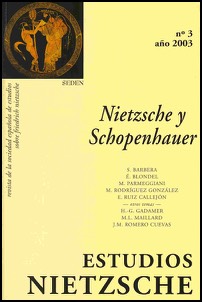Contra Kant y Schopenhauer. La afirmación nietzscheana
DOI:
https://doi.org/10.24310/EstudiosNIETen.vi3.9108Abstract
Se intenta precisar el significado de la afirmación (así como del amor fati y del buen humor, Heiterkeit) en el pensamiento de Nietzsche. Para ello, es puesta en relación con sus críticas a Schopenhauer (de quien toma las tesis cambiándolas, por así decirlo, de signo) y con su polémica contra la moral de Kant, tal como la expresa sobre todo en el aforismo 11 de El Anticristo, del que se hace un comentario detallado.
Downloads
Metrics
References
Decher, F., Wille zum Leben – Wille zur Macht, Königshausen, Würtzburg, 1984.
Haar, M., «La critique nietzschéenne de Schopenhauer», en Par-delà le nihlisme, PUF, Paris, 1998.
Wotling, P., Nietzsche et le problème de la civilisation, PUF, Paris, 1995.
Schopenhauer, A., El mundo como voluntad y representación, vol. II, cap. XLI: «Sobre la muerte y su relación con la indestructibilidad de nuestro ser en sí».
Valadier, P., Nietzsche. Cruauté et noblesse du droit, Michalon, Paris, 1998.
Downloads
Published
How to Cite
Issue
Section
License
As of issue 21 (2021) this journal is published only in open access (diamond route).
From that number 21, like the previous numbers published in NIETZSCHE STUDIES, they are subject to the Creative Commons Acknowledgment-NoComercia-ShareIgual 4.0 license, the full text of which can be consulted at <http://creativecommons.org/licenses/by-nc-sa/4.0 >
It is the responsibility of the authors to obtain the necessary permissions of the images that are subject to copyright.
This work is licensed under a Creative Commons Attribution-NonCommercial-ShareAlike 4.0 International License.
Copyright generates two different rights: moral rights and patrimonial rights that EJFB recognizes and respects. Moral rights are those relating to the recognition of the authorship. They are rights of a personal nature that are perpetual, inalienable, unseizable and imprescriptible as consequence of the indivisible union of the author and his/her work.
Patrimonial rights are those that can be derived from the reproduction, distribution, adaptation or communication of the work, among others.







11.png)
